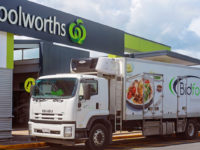
The growing trend towards a healthy and sustainable lifestyle could be worth about $25 billion and make up about 10 per cent of the value of Australia’s food and agribusiness sector by 2030, according to national science agency CSIRO.
The area of biggest market potential, after fortified and functional foods, is in alternative proteins, including plant proteins such as soy and pea.
According to Katherine Wynn, CSIRO’s senior economic advisor, the market for alternative proteins is expected to grow at about 5 per cent a year, more than double the rate of 2.4 per cent for the entire food and agribusiness sector.
“As well as domestic and export sales valued at $6.6 billion in 2030, we estimate alternative protein sources may be worth $5.4 billion in carbon emission and water savings,” Wynn wrote on the findings.
One business that is already exploring the potential of plant-based proteins and is eager to put Australia at the front line of the development of these ingredients is Eat Group.
The food and agricultural business began exploring alternative protein sources when a client requested an option for their protein powder that was more suitable for a vegan market.
To fulfil the request, they needed to find a suitable plant protein substitute for whey that would integrate well into food and beverages.
“At the time, we looked at various opportunities and couldn’t really find a product that was fit for purpose. So we set upon the path of exploring the potential opportunities around alternative plant proteins, to replace existing animal proteins,” Brendan McKeegan, Eat Group’s founder and director, told Inside FMCG.
“What we identified as part of that process was that there was a growing demand, particularly internationally, for access to product that was high consistent quality, and had some certain functional elements that would enable it to be integrated into various food and beverage products as an alternative to whey protein.”
The team worked with food technologists and CSIRO to reengineer the extraction process to the point it could be commercialised.
“We got to a point where we could create a consistent faba bean protein powder that had approximately 86 per cent protein content, but more importantly, some really excellent functional attributes around taste, smell, colour, solubility, etc. What we ended up producing was something that was really fit for purpose across a number of food and beverage applications.”
Australian Plant Proteins was born, and in July this year the business secured $20 million to begin the fitout of the first commercial extraction facility in Australia, in Horsham, Victoria.
The main investor in the facility is Scalzo Foods, having put forward $9.2 million, and the food business will also handle distribution of the end product.
Michael Scalzo, Scalzo Foods managing director and CEO, had been exploring opportunities around plant proteins and was excited about the idea that Australia could be a big player in this field, given the ability to produce large-scale pulses.
“We’ve been in the ingredients business for 40 years, and we’ve missed so many opportunities over those decades, where other countries have jumped ahead of Australia,” Scalzo told Inside FMCG.
“We heard about what Brendan and the team at Eat Group had been working on, and it ticked all the boxes. It was a great value-add opportunity, working with fantastic products, from a growing and a farming perspective, that we take through a more sophisticated process, turn out a value-added ingredient that we could then sell both domestically and internationally to be part of this broader plant-based protein movement, which I think has a tremendous future ahead of it.”
Scalzo Foods will act as a bridge between APP and its network of customers across the food industry in Australia and New Zealand, and its growing international customer base.
“We’ve got our own innovation and development team in-house that we will deploy to help take the raw materials that will come out of this facility in Horsham and help our customers generate them into the finished product ideas that will work for them.”
McKeegan said the opportunities in plant-based proteins go way beyond alternative meat products. As well as acting as a replacement in protein powder, shakes and bars, it works as a replacement for egg white in vegan mayonnaise, it can be used in extruded products like pastas and to fortify plant-based products such as alternative milks, that may be low in protein.
“Faba has quite a broad appeal across a range of food and beverage products. Because of the high protein content, it has the ability to integrate seamlessly without masking the taste,” McKeegan said.
“We’ve been extremely pleased and in some cases surprised in relation to its applications.”
Australian Plant Proteins operates as a zero waste plant, because the by-product of the process is used to create stock feed.
McKeegan said they have been able to create a relatively efficient process in terms of energy consumption and environmental footprint.
“Sustainability is one of the key trends driving the consumption. The negative contribution to the environment and the elements around sustainability, particularly water consumption, significantly reduce when you start consuming plant proteins.”
“From a farmer’s perspective, we’re giving them an alternate route to market through a value-add process, as opposed to just exploiting the product into a global commodity market as a whole being.”
Wheat and barley farmers typically use a pulse rotation to put nitrogen back into the soil.
“We’ve got quite a significant R&D component ahead of us. We’ve started to experiment with products, such as lentils, chickpeas, mung beans, various other pulses that will provide us further opportunity to look at other food applications.”
The Horsham facility will be capable of producing 5000 tonnes of plant protein extract every year once it hits full capacity. McKeegan expects the plant to reach that capacity within 18 months of opening.
















